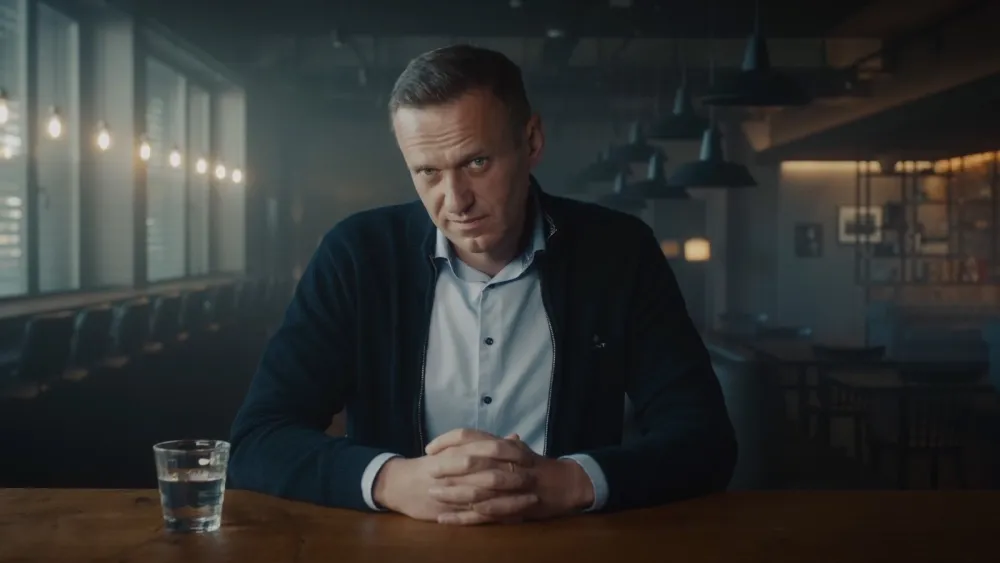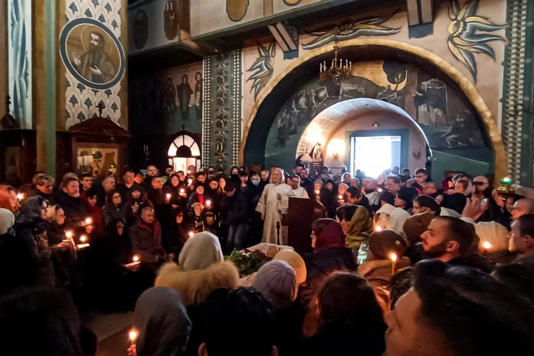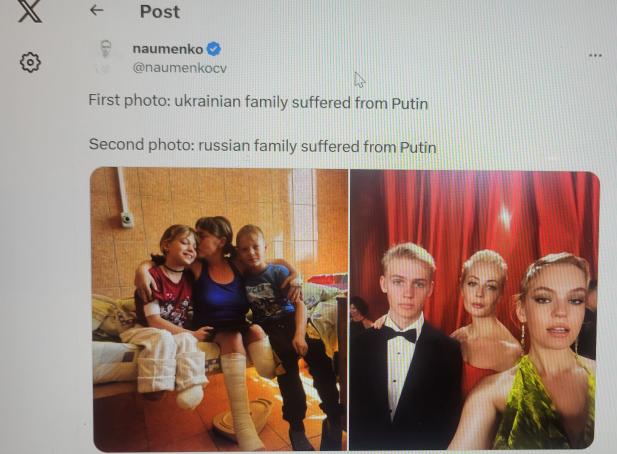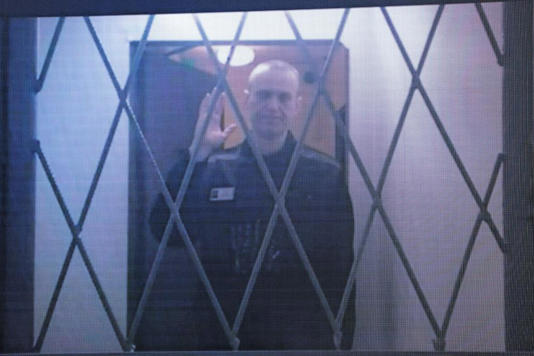By: Kimberly Stefancik
Courtesy of CNN Films
Depending on which side you look at the life and death of Alexei Navalny, Russia’s anti-corruption/ fiercest critic of Putin and the Kremlin, it is likely to elicit debate.
Navalny led an interesting life to say the least. He was born 4 June 1976 in Butyn, Russia, which is a rural village in Moscow Oblast, population under 200 according to a 2010 census. His father Anatoly, who was born in Ukraine, was a Communist Soviet army officer, and his mother Lyudmila was an economist. He summered in Chernobyl, Ukraine with his grandmother and in 1986, the family was evacuated after the nuclear disaster, but they still bore witness to the attempted Soviet cover-up of the nuclear power-plant meltdown. It was reported at that time, Navalny started to form his views of the Soviet Union as being greedy, hypocritical liars. He attended University in Moscow and graduated with a law degree in 1998. It was clear his mother’s background as an economist was a motivator on his life’s progression, as he joined a political party that promoted liberal democracy and a market economy.
In the later part of the first decade of 2000, Navalny ramped up his whistleblowing and anti-corruption efforts. As dissent was becoming restricted, Navalny took on the task of buying shares in state-owned entities and he started grilling the major shareholders in meetings. He brought to widespread knowledge the trillion rubles ($30+ billion USD) that was being embezzled from the state-run system. It was at this time, the Kremlin made note of Navalny and set about to clamp down on dissent, leveling corruption charges and criminal charges at him and his organization, followers, and protestors. For many years, Navalny attempted to participate in the Russian electoral system, and that term is used loosely, as it is widely established how Putin’s party established the outcomes of elections. It was always predetermined who was going to win: Putin or Putin by proxy.
However, Navalny and his anti-corruption “Progress Party” gained momentum in various elections, but the Kremlin made sure it would never come to pass. He was handed convictions and suspended prison sentences. His party’s registration was revoked, effectively making it impossible for them to win. In 2014, Putin invaded Crimea and the illegal annexation of the autonomous republic happened, while largely being ignored by the West, but simultaneously condemned.
This is arguably when the contempt of Navalny arose by the Ukrainian people. At the time, Navalny still held many nationalistic beliefs and was pro-Russian imperialism. He was pro-annexation of Crimea by Russia, stating in an interview in 2014, “Crimea would remain part of Russia” and he criticized the transfer of Crimea in 1954. While he made many conflicting statements over time regarding Crimea, many Ukrainians never got over it. Further, he sowed his contempt of Ukrainians by using the racial slur, “khokols” in a tweet in 2014 and also used slurs against non-Slavic ethnicities in Russia. There are other instances of derogatory statements against Georgians, calling them “rodents” and lobbying for violence against their country in the 2008 Russo-Georgian war. It appears to show a long history of Xenophobia from Navalny.
He founded the Anti-Corruption Foundation to investigate the illicit wealth of Russian elites in 2011. Navalny ran for President of Russia in 2018 and was notoriously poisoned in 2020. The poisoning attempt later was determined to be the chemical weapon Novichok used by FSB officers. In fact, had it not been by the fast landing of his flight as he was video recorded to be groaning in pain, and the prompt treatment in Berlin, Germany, he would have certainly perished then. According to his family through interviews, Navalny made a miraculous recovery and returned to Russia to face the charges against him. Many to this day question why he returned to Russia. He may have lived in exile to continue his fight. As his Foundation was recognized as an extremist organization in Russia, and its team members still continue to reside in exile, why did Navalny return? It may be one of those answers the public really never knows. As the author muses, perhaps he wanted to be a martyr for the cause? Or maybe he thought he had the support of the West to fight charges against him?
He was sentenced to prison in 2021 after his return to Moscow. Prison is not anywhere anyone wants to be, and the Russian penal system is arguably one of the most inhumane in the World, at least in North America and Europe. At the beginning of his sentence, Navalny maintained his presence on social media via his attorney. He also interestingly became a critic of Russia’s full-scale invasion of Ukraine. The latter part of his life became the subject of the Documentary, “Navalny.” It went on to win the Academy Award for the same category in 2023.
Beforehand in March 2022, Navalny was convicted of new charges, and was transferred to an even harsher maximum-security prison and served much of his time in the soul-breaking solitary confinement. Still, he encouraged his followers to protest the unjust War on Ukraine and in the meantime, criticism of Russia’s “special military operation” became illegal. At the end of 2023, his attorney’s lost contact with him and he was transferred to a penal colony in the Arctic Circle.
It was there, Navalny mysteriously died while incarcerated in February 2024. In true Kremlin style, they him hawed with the release of his remains. Did he die by poisoning? Did he suddenly drop dead after a brief walk? Did he die by the “one punch” to the heart? Was it a blood clot as the Kremlin claimed? Maybe they delayed as long as possible to negate the potential autopsy results of a poisoning. To date, there is still no clear cause of death. Upon further pressing, protests, and his mother filing suit for his remains to be released, the Kremlin opted to have his body released. His mother and attorney were diligently waiting at the penal colony in Siberia for an answer. But the Kremlin nearly made it impossible for a proper funeral and viewing of the body. Initially, no funeral home would host the funeral, no hearse would transport the body, and funeral goers were threatened by the presence of the omnipresent Russian riot police.
Despite the implications, a mile-long queue of mourners formed, chanting anti-Putin slogans. One of Navalny’s last statements was, “Your honor…I call on all citizens of Russia to fight this regime, this war, this mobilization.”
© AFP via Getty Images
In an interview with Navalny’s daughter Dasha, who has the distinct privilege of studying at Stanford University in the United States, while hundreds of thousands of Ukrainians have died in the War…she exclaimed about her Father’s continuous punishment of solitary confinement, “The real reason…has always been, of course, Navalny’s condemnation of the Ukraine War and his opposition to the Putin regime.” She and her family received stark disapproval for accepting the Academy Award for Best Documentary Feature Film, “Navalny” in their elegant gowns, while President Zelenskyy was not permitted to give a pre-recorded speech, in an effort to not make the event “so politicized.” Many Ukrainians were aghast that a Russian family had center stage for such a pivotal moment in recognition. Even still to this day, his family receives remarkable protections in both Europe and North America, with his wife Yulia vowing to keep up the fight against Russia.
Yulia Navalny has been making the speech circuit in both Europe and the United States, hugging President Joe Biden in San Francisco and receiving condolences, and their daughter continues her studies at Stanford University. It is at this point important to question did Navalny truly have an about face on pro-imperialist Russia? Given his rhetoric concerning Ukraine in the past, did he change his stance or was it politically motivated to gain support from the West? “The enemy of my enemy is my friend,” or in Latin, “Amicus meus, inimicus inimici mei" ("my friend, the enemy of my enemy,”) comes to mind. But it has also been questioned in the case of Navalny, was the enemy of our enemy, an ally to Ukraine? In 2011 Navalny famously said, “Of course it would be great if now we lived in one country with Ukraine and Belarus, but I think sooner or later it will happen.” Another time he proclaimed, “I myself am half Russian, half Ukrainian.”
The about face of his position leaves Ukrainians and free-thinking people in the West to question the authenticity of his dispute with Russian imperialism. How does one go from xenophobic, overtly homophobic, pro-Russian nationalism…to taking a stance allegedly against the War on Ukraine? Scholar Maria Popova said, “He has denounced the War, but not Russian imperialism.” She also said that fighting autocracy and corruption in Russia are not necessarily relevant to Ukrainians. Before his death, Navalny never adequately addressed the issue of Ukraine’s territorial integrity, one of the main points of Russia’s unprovoked War on Ukraine. In response to Navalny’s death, the US Department of State and Department of Treasury, and Commerce issued additional sanctions and restrictions against more than 500 individuals and entities in an effort to further deprive Russia of needed revenues.
Arguably, his death leaves a gaping hole for those who fought against the authoritarian regime in Russia. His death revitalized calls for revolution in Russia and it seems doubtful his wife has the charisma, that “X” factor to lead it from exile. She does insist she’ll keep up the fight along with their organization that is operating abroad.
In a way to pour salt in the wound, the propaganda was released (it always comes from the Kremlin) claiming Navalny was days away from a prisoner swap and to be released. That seems unlikely, as Navalny was a crown jewel for the Kremlin in captivity- showing how the opposition is dealt with.
© Vera Savina/AFP via Getty Images







